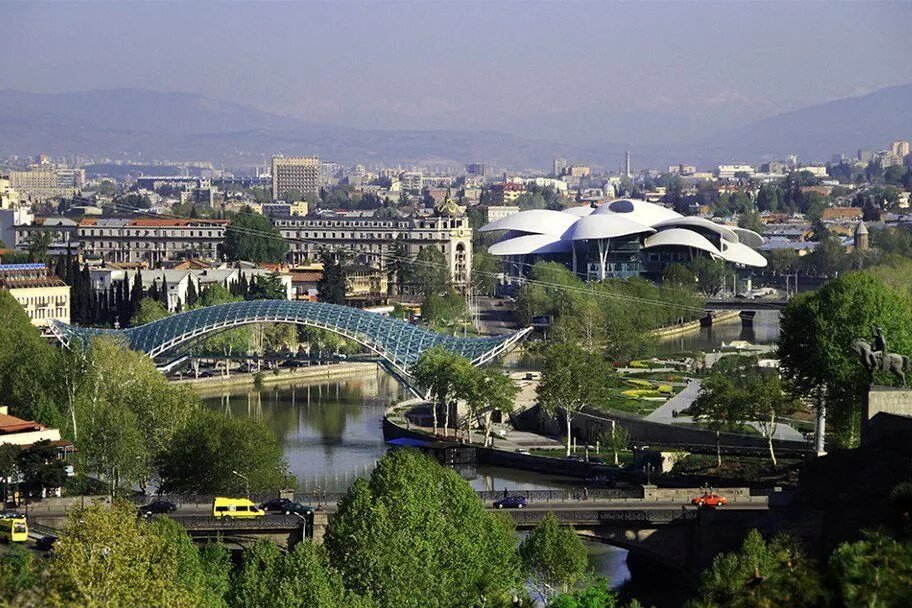
Speakers:
Nika Shavishvili – Full Professor, Head of the Department of Theory and History of Architecture, Faculty of Architecture, Urbanism and Design, Technical University of Georgia; Founder and Director of CID Architecture;
Gia Abuladze – Architect;
Alexander Elisashvili – Chairman, Tiflis Hamkari;
Vladimir Vardosanidze - Professor, Technical University of Georgia; Expert of the Heinrich Boell Foundation South Caucasus Regional Office;
Moderation: Gogi Gvakharia.
Urban Studies is one of the priority for the Heinrich Boell Foundation, - with these words Gogi Gvakharia, the moderator of the public debate opened the discussion: “Participatory Urban Development – The Way towards Social Compact” organized by the Heinrich Boell Foundation South Caucasus Regional Office on 12 October 2011. The HBF devoted several public discussions to the issue of urban development in the past, although participants found the October 12 event particularly informative. City officials did not attend the debate, but the audience had a unique opportunity to receive specific information about on-going development projects in Tbilisi from authors and representatives of the constructions companies.
“New Life of Old Tbilisi”, Vere highway, reconstruction of Aghmashenebeli Avenue, the history of Mirza Shafi Street, changed Rike and the fate of the former 'Imeli' building - these are some of the issues that attracted great interest from the city inhabitants lately, but had very limited information about them.
“The title of today's discussion is a dream for me and my friends, but this is still unachievable in Tbilisi," said Aleko Elisashvili, the chairman of the Tiflis Hamkari. According to Elisashvili, the closed regime of the Tbilisi Mayor's Office has been echoed by development and building companies, which also avoid public scrutiny and accountability.
According to Lado Vardisanidze, a number of positive changes were observed in Tbilisi's urban development in recent years. From 2012 the Mayor's Office will start collection of urban indicators, which will enable to foresee development of processes in the field. Vardosanidze also talked about the history and experience of the citizen’s participationin the urban development processes - “The founder of this concept is Patrick Geddes, Scottish town planner. Since then, citizen's active participation in urban development processes is an integral part of urban planning in Europe and the USA."
What does the public participation mean and is the contemporary Georgian society interested in being actively involved in city development? - asked the moderator to Mr. Vardosanidze. "Unfortunately, not", answered Vardosanidze. In his opinion, the syndrome of Homosovietikus is still alive in our society, and alienation from the environment is common and widespread.
Lado Vardosanidze also talked about the Code, which is currently under development at the Ministry of Economy and Sustainable Development of Georgia. The title of the document is the Spatial Planning and Construction Activities Code. "Article 24 of the Code which concerns formation of spatial planning objectives, documentation, project development and open review processes, is very scarce." At this stage authors are collecting comments, everyone is entitled to offer his/her own initiative, said Vardosanidze.
Architect Nick Shavishvili talked about practice and mechanisms for citizens' participation in European countries. Organization of public discussions, announcements of local and international tenders is obligatory in European countries for all projects. Similar mechanisms should be implemented and enforced in Georgia. "Protests and demonstrations held by certain groups, no matter how noble their goal is, are often useless," added Shavishvili.
Architect Gia Abuladze believes that a constant dialogue among authorities, practitioners/urban specialists and the public about Tbilisi's urban development is one of requirements of the democratic society. According to Abuladze, citizens' participation in Tbilisi's urban planning is difficult to imagine today.
Are there plans to establish the Construction Code in Georgia, how and under which circumstances should the public become engaged in construction projects, whose opinion must be taken into the consideration, should we consider opinions of professionals or the population from the particular area of the city, where the project is planned? Is Georgia a member to any international urban organization, is an architect only a creator of his work or a socially active figure? - These were questions asked by architects and interested individuals participating in the discussion. In addition to discussing theoretical issues, the discussion also touched upon specific topics, such as demolition of Mirza Shafi street. Architect Giorgi Beridze talked extensively about this history of Mirza Shafi Street demolition. There was no approval from the specialists on cutting the rock and the demolition of the street – declared several architects present at the discussion.
"Discussion and debates has meaning before decisions are made. The goal of our organization is to live in the city where the Mayor or construction companies respect the city and its inhabitants, and always inform them about projects before their commencement and before bulldozers start working. The Law should regulate mechanisms of citizen's participation," said Aleko Elisashvili.
The debate ended with an agreement achieved by the Chairman of the Tiflis Hamkari and the representatives of the construction companies. They agreed to further elaborate mechanisms for involving civil society organizations in planning development/construction projects.
This agreement is one of the significant achievements of the HBF public debate.
- Full text of the debate (pdf, 256 KB)